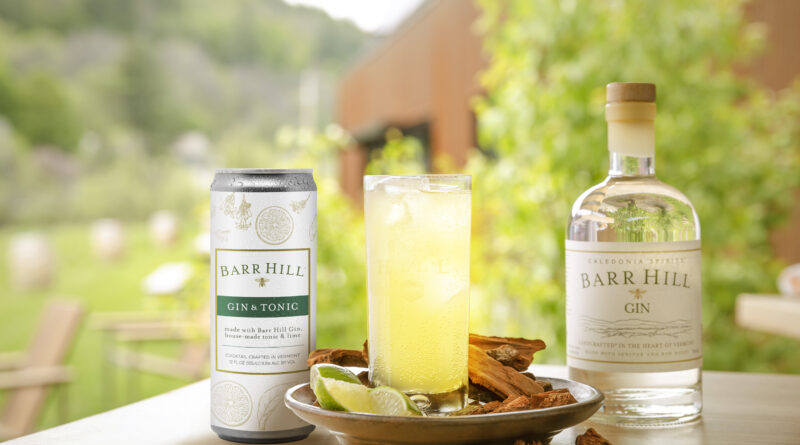Canned Cocktails To Go? Yes, Please!
If you follow the cross-country ski trails from Craftsbury Outdoor Center toward Greensboro you may come to the Barr Hill Natural Preserve. It’s a 256-acre parcel that The Nature Conservancy, which has owned it since 1972, calls “one of the prettiest picnic spots in Vermont.”
In Crossing to Safety, Pulitzer Prize-winning author Wallace Stegner wrote of Barr Hill “…this is where I go when I need to pace something out, to knead an idea or predicament like dough. Others might head for steep mountain trails, but I love this rutted one-lane track rising above the pretty village.” In the summer, bees buzz the branches of maples, cedar and birch and, collect nectar from the wild clover and asters that grow in the clearings. Come winter, skiers glide across the frozen land.
It’s near here that beekeeper Todd Hardie has kept bees, collecting and selling their honey. It’s near here too that Ryan Christiansen, a lifelong Vermonter, branched out from working in his parents’ hardware store to start a small distillery using a copper still warmed over a fire. The two teamed up in 2011 to start Caledonia Spirits. They would use Hardie’s raw honey – kept raw to preserve its terroir – to finish off the distilled juniper to make a very, very good, small-batch gin that sells for nearly $40 a bottle.
Flash forward 12 years and Barr Hill Gin has captured top awards at international spirits competitions from New York to Hong Kong, making it one of the world’s most lauded gins. By 2019 operations had outgrown the original space in Greensboro and Caledonia Spirits, which produces Barr Hill Gin, moved to a state-of-the-art distillery in Montpelier. There, giant stills gleam like a proud cook’s display of polished copper pots. They are named Phyllis, Ramona, Irene and Sheri – for the distillers’ grandmothers.
Some of what they produce goes into new oak barrels to age, becoming the darker, earthier Barr Hill Reserve Tom Cat gin. All the gins (and a Barr Hill vodka now as well) are eventually put into in hefty glass bottles and sealed with bee’s wax… except the gin that is saved for cans.
Wait, cans?
Yes, during the Covid pandemic, Vermont loosened its liquor laws to allow for “cocktails to go.” In 2022, the legislature passed a law making “ready-to-drink” cocktails legal for the first time. That opened up a new market for canned cocktails and set Vermont’s distillers thinking: could they deliver a RTD (ready-to-drink) cocktail in a can or small bottle that was as good as what you might get at a bar?
Caledonia Spirits was the first in Vermont to deliver a canned gin and tonic. Christiansen himself was skeptical at first that a cocktail could be mixed correctly, canned and still stand up to the standards he had set. “Real tonic is hard to find, but when made well, it’s as good as the gin,” he said. So, Barr Hill set out to make its own tonic, using cinchona tree bark, lemongrass, fresh citrus, and Barr Hill honey. It mixed the two and the canned Barr Hill Gin & Tonic was born. The company paired with the Mad River Valley’s Sean and Karen Lawson (founders of Lawson’s Finest Liquids) to have their distribution company, The Beer Guy, deliver the cans cold to liquor stores around the state. The canned cocktails, which come in 4-packs of 12 oz. cans and have a 9.3% ABV, went on sale in April for $19.99.
The 2022 law limits the alcohol content of the ready-to-drink (RTD) canned cocktails to below 16% alcohol by volume (ABV) and 24 oz. in size. It also expands distribution and sales of the canned cocktails to all of Vermont’s 1,200 licensed independent markets and stores, rather than just the 76 Department of Liquor and Lottery (DLL) agency stores.
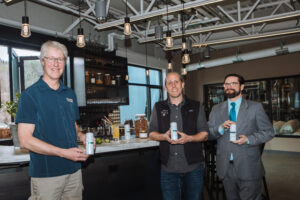
Other craft distillers have gone the canned cocktail route as well. “These have the chance to become like Vermont’s craft beer industry,” said Rep. Matt Birong, D-Vergennes, of Addison County who helped pass the legislation. According to an April 2023 report by Future Market Insights, the U.S. market for ready-to-drink canned cocktails was projected to go from $18.822 billion in 2023 to $33.247 billion by 2033.
As with the craft beer market, Vermont’s terroir-based small-batch distillers are highlighting the quality of their still relatively small-batch products.
In a barn in Windsor, Vermont not far from the small ski area at Mount Ascutney, Silo Distillery has been distilling “barn to bottle” gins, whiskeys and vodkas for 13 years. The distillery was started by eighth-generation Vermonter Peter Stillson and Anne Marie Delaney, of Barnard. “All of our ingredients are sourced at local Vermont farms; the grains from Grembowizc farm in North Clarendon. The maple used in the whiskey comes from Randolph, Vt. and the lavender (used in the lavender vodka) comes from a farm in Derby, near the Canadian border,” says Stillson. Silo started creating ready-to-drink cocktails such as their Lavender Cosmo in small glass flasks five years ago.
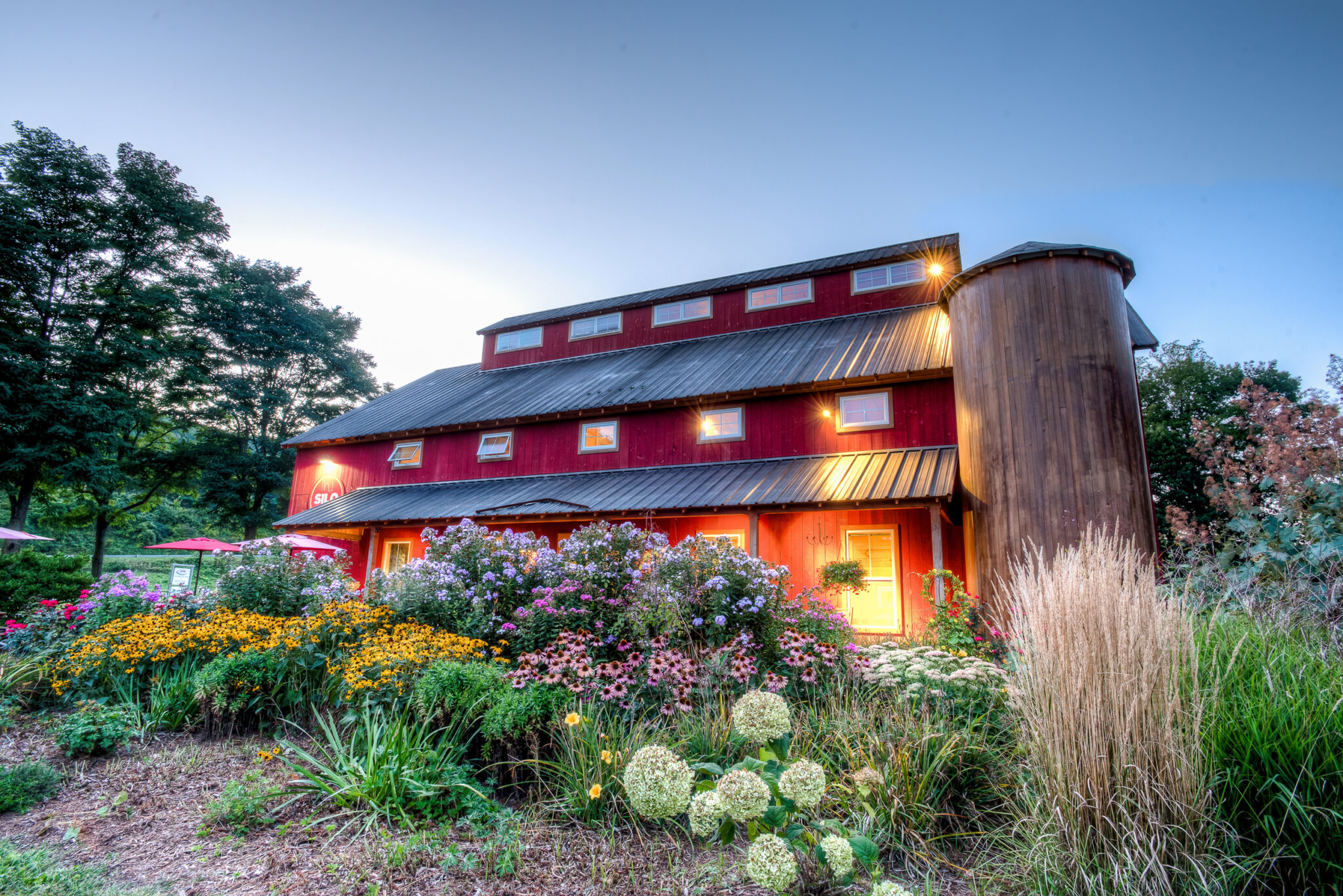 However, when the liquor laws changed, the distillers realized there was a new opportunity. “Suddenly instead of just selling in 72 liquor stores, we could sell in a thousand markets,” says Stillson. Silo’s canned cocktails all meet the ABV alcohol percentage limits. Now, in addition to the flasks of Maple Manhattan and Maple Whiskey Sour, a Lavender Cosmo was introduced in January 2023 in a lavender-tinged can with a 10% ABV. A canned Vodka Paloma is also just coming to market and Tillson expects a third RTD will be available by the end of the year. “We’re still really small – just 8 people – and still source everything locally so that limits how much we can produce, but we see this as a growing market,” he says.
However, when the liquor laws changed, the distillers realized there was a new opportunity. “Suddenly instead of just selling in 72 liquor stores, we could sell in a thousand markets,” says Stillson. Silo’s canned cocktails all meet the ABV alcohol percentage limits. Now, in addition to the flasks of Maple Manhattan and Maple Whiskey Sour, a Lavender Cosmo was introduced in January 2023 in a lavender-tinged can with a 10% ABV. A canned Vodka Paloma is also just coming to market and Tillson expects a third RTD will be available by the end of the year. “We’re still really small – just 8 people – and still source everything locally so that limits how much we can produce, but we see this as a growing market,” he says.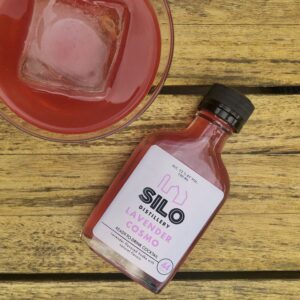
Chris Kesler opened Black Flannel Brewery & Distillery after his homebrewed beers began winning state-wide contests. He teamed up with distiller Dave Mosher (a former general manager of Dartmouth Skiway in New Hampshire and distiller at Dunc’s Mill) to launch a brewery/distillery and an award-winning restaurant in Essex Junction, Vt. in 2020.
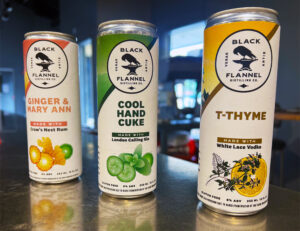
As Covid hit, Kesler, who is the vice-president of Distilled Spirits Council of Vermont helped champion the new RTD legislation. Black Flannel came out with their first canned cocktails on July 1, 2022. “We’ve since tweaked them some and rebranded,” he says. “We wanted a truly unique cocktail, something you might not mix at home.” Of the four 6% ABV canned cocktails they now produce, Shrubbly, which pairs maple-blueberry shrub created by Shrubbly of Hinesburg with Black Flannel’s White Lace Vodka and other local ingredients is the most creative example.
In the shadows of the ski area of the same name, Smuggler’s Notch Distillery was founded by the father/son team of Ron and Jeremy Elliott in 2006. By 2010 their vodka won a gold medal from the Beverage Tasting Institute – the highest honor. While the wheat and sweet corn that are fermented to make the drink come from away, 60 percent of vodka is Vermont water and Smuggler’s Notch can thank the snowmelt and a particulate filter for its terroir.
The brand recently launched its first two canned cocktails as well, a vodka soda made with maple, lime and ginger and another made with Morrocan rose and grapefruit. The low alcohol content—5% ABV makes these a refreshing and lighter beverage, more like a hard seltzer or spritzer.
Other Vermont distillers have been testing the waters (so to speak) and you can expect to see new ready-to-drink craft cocktails come on the market soon. u

